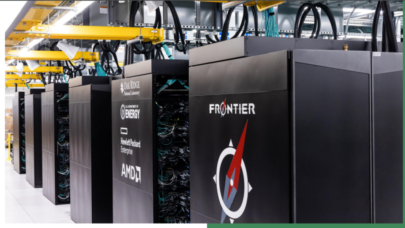
AMD Shows Off MI300 Chip for the First Time
January 5, 2023
At the tail end of AMD’s 75-minute CES keynote, held yesterday in Las Vegas and via livestream, CEO Lisa Su shared new details of the forthcoming MI300 chip and publicly unveiled the silicon. The MI300 (teased earlier this year) is the first to combine a CPU, GPU and memory into a single integrated design, incorporating nine 5nm chiplets that are 3D stacked on top of four 6nm chiplets with 128 gigabytes of HBM3 memory. Read more…

Top500: Exascale Is Officially Here with Debut of Frontier
May 30, 2022
The 59th installment of the Top500 list, issued today from ISC 2022 in Hamburg, Germany, officially marks a new era in supercomputing with the debut of the first-ever exascale system on the list. Frontier, deployed at the Department of Energy’s Oak Ridge National Laboratory, achieved 1.102 exaflops in its fastest High Performance Linpack run, which was completed... Read more…

HPE, AMD to Power New French Supercomputer ‘Adastra’
November 15, 2021
HPE – working with France’s HPC agency, GENCI, and its National Computing Center for Higher Education, CINES – announced a stellar win today at SC21: it will build France’s 70 peak petaflops Adastra supercomputer, scheduling another leading system for delivery in Europe on the heels of a string of EuroHPC system debuts. The system, slated for delivery and... Read more…

- Click Here for More Headlines

Whitepaper
Transforming Industrial and Automotive Manufacturing
In this era, expansion in digital infrastructure capacity is inevitable. Parallel to this, climate change consciousness is also rising, making sustainability a mandatory part of the organization’s functioning. As computing workloads such as AI and HPC continue to surge, so does the energy consumption, posing environmental woes. IT departments within organizations have a crucial role in combating this challenge. They can significantly drive sustainable practices by influencing newer technologies and process adoption that aid in mitigating the effects of climate change.
While buying more sustainable IT solutions is an option, partnering with IT solutions providers, such and Lenovo and Intel, who are committed to sustainability and aiding customers in executing sustainability strategies is likely to be more impactful.
Learn how Lenovo and Intel, through their partnership, are strongly positioned to address this need with their innovations driving energy efficiency and environmental stewardship.
Download Now
Sponsored by Lenovo
Whitepaper
How Direct Liquid Cooling Improves Data Center Energy Efficiency
Data centers are experiencing increasing power consumption, space constraints and cooling demands due to the unprecedented computing power required by today’s chips and servers. HVAC cooling systems consume approximately 40% of a data center’s electricity. These systems traditionally use air conditioning, air handling and fans to cool the data center facility and IT equipment, ultimately resulting in high energy consumption and high carbon emissions. Data centers are moving to direct liquid cooled (DLC) systems to improve cooling efficiency thus lowering their PUE, operating expenses (OPEX) and carbon footprint.
This paper describes how CoolIT Systems (CoolIT) meets the need for improved energy efficiency in data centers and includes case studies that show how CoolIT’s DLC solutions improve energy efficiency, increase rack density, lower OPEX, and enable sustainability programs. CoolIT is the global market and innovation leader in scalable DLC solutions for the world’s most demanding computing environments. CoolIT’s end-to-end solutions meet the rising demand in cooling and the rising demand for energy efficiency.
Download Now
Sponsored by CoolIT
Advanced Scale Career Development & Workforce Enhancement Center
Featured Advanced Scale Jobs:
HPCwire Resource Library
HPCwire Product Showcase
© 2024 HPCwire. All Rights Reserved. A Tabor Communications Publication
HPCwire is a registered trademark of Tabor Communications, Inc. Use of this site is governed by our Terms of Use and Privacy Policy.
Reproduction in whole or in part in any form or medium without express written permission of Tabor Communications, Inc. is prohibited.
























